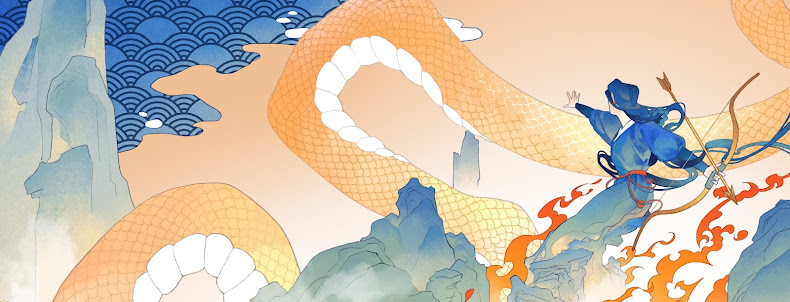This
fantasy novel was grippingly immersive with a complex plot and creative
execution! The narrative, though seemingly grounded in the Second Sino-Japanese
War, is woven with heavy mythological elements and featuring fantastic characters
and locales. It’s nonetheless not difficult to identify the real equivalents of
major locales where key historical military events actually took place.
Part
One tells how a young orphaned peasant girl named Rin, in order to flee her
destiny of being married off against her will, succeeds against all odds in entering
the Nikara Empire’s most prestigious military academy at Sinegard, the capital.
All her fellow students come from noble families, which make her feel like a
fish out of water. But her strong will, intelligence and grit pit her against
Nezha, the brilliant and arrogant son of the Dragon Province Warlord, who is
way beyond her match in combat training, and who has no qualms in belittling
her. In a year-end tournament, she accidentally discovers that she can call up
a hidden lethal flame. Her desire for supernatural power urges her to take up
apprenticeship in Lore (which focuses on the study of shamanism) with Master
Jiang, who teaches her to meditate in order to access the deities of the
Pantheon, but warns her that asking for power bears a price.
During
her two years at the academy, she comes to befriend Kitay, who is a walking
encyclopedia, and she secretly admires Altan, the attractive and invincible
combatant and the only war survivor from the island of Speer, which a few
decades earlier was brutally annihilated by Mugen. Then comes the day when the
academy students learn that the newly enthroned Mugen Emperor is planning to
invade the Nikara Empire.
In
Part Two we see the academy Masters and students being drafted into military
divisions in preparation for Mugen’s invasion into Sinegard. During a bloody
scuffle, Rin manages to call up her flame to incinerate Nezha’s attacker. When
the Masters at the academy see that, they send her to the Cike, which is a
group of assassins that will fight as the Thirteenth Division under Altan’s
command. She then discovers that she is also a surviving Speerly, like Altan,
and that the assassins are all shamans who can call the gods for aid. Under
orders from the Nikara Empress, Altan leads the Cike to Khurdalain, the war
front. After beating back the Mugenese army from the coast, Altan receives news
that Golyn Niis to the south is under siege. The Cike must go to their rescue.
Part
Three describes the carnage and aftermath of Mugen’s massacre at Golyn Niis, as
recounted to the Cike by Kitay and another female student. Many of the academy
Masters and students have been savagely killed. To avenge them, and to save the
Nikara Empire, Altan and Rin want to seek help from powerful but retired
shamans who are imprisoned in a stone mountain. On their way out, they are
waylaid by Mugenese soldiers and unspeakable things happen to them. A brutal
truth of betrayal is also revealed. Rin becomes so heart-broken and enraged that
she is determined to ask the Phoenix (the goddess of fire and vengeance) to
grant her the power for revenge, knowing full well that she has to pay a price
for it.
I’m
giving this book 3.5 stars.
I
might mention that I had previously read The
Good Man of Nanking: The Diaries of John Rabe, which is an eye-witness
account of the Nanjing massacre. Here’s my review: https://www.goodreads.com/review/show/1961225283
PS:
Since finishing all three books in the trilogy, I've had second
thoughts about the author's plot points choices. It's well understood
that the story is based on the Second Sino-Japanese War in general and
the Nanjing massacre in particular. In The Popper War there's the
insensitive playing upon the Nanjing massacre victims's sufferings for
melodramatic effects. The whole idea of making a gender-bending parody
out of a prominent albeit unlikable historical character (Mao Zedong)
and of exploiting a piece of traumatic Chinese history for the sake of
profit-making doesn't sit well with me.
